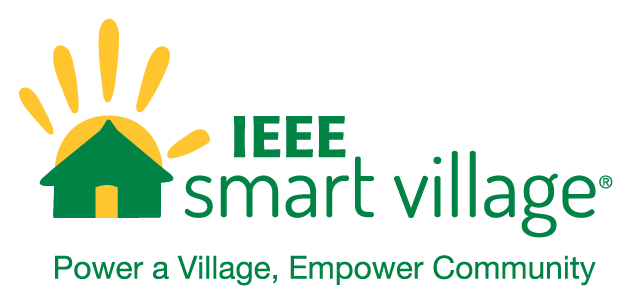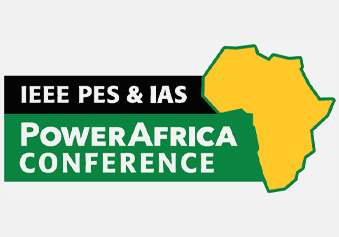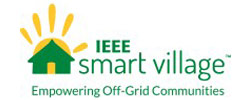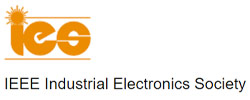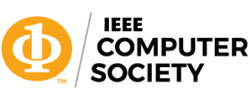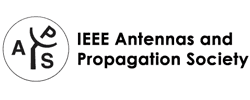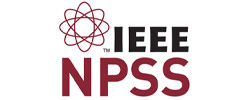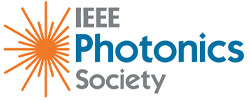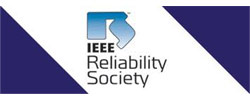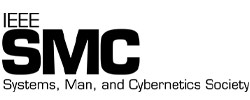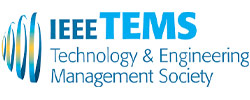EMPOWER: Vol 2. Issue 5 – June 2021
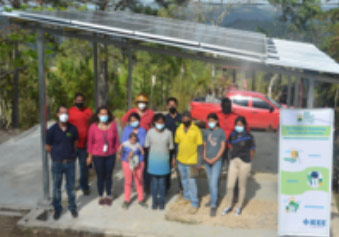
Industrial Electronics Society, Latin America Working Group and IEEE Honduras Section
Precedent Setting Project completed
Approximately one year ago, Morgan Kiani proposed that the Industrial Electronics Society (IES) work with IEEE Smart Village to provide electricity to light up schools and homes in Honduras. She had a vision and mission to help empower women in the villages of Honduras.
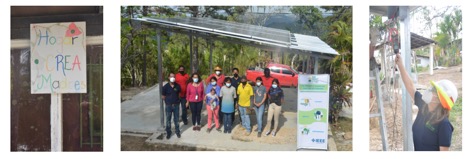
A group of young mothers with technicians and local volunteers from IEEE Honduras Section at Hogar CREA standing under the new structure that was built to install solar PV panels. On the right side, Section officer Ethel Enamorado verifying electrical connections and measuring voltage on the power cords.
To say the least, Morgan was persistent, but the Covid pandemic was an obstacle that challenged Morgan’s ability to get the project done. Her first and second proposed project sites failed to materialize primarily due to the pandemic. Not to be deterred, Morgan contacted Mario Aleman who heads the recently formed IEEE Smart Village Latin America Working Group. Mario not only agreed to help, he also solicited help from IEEE Honduras Section, encouraging them to take local ownership of the project, helping coordinate the project, and was at the site with the contractor and volunteers from IEEE Honduras Section to complete the project.
Wood-burning stove in kitchen produces emissions that can irritate lungs, cause inflammation, affect the immune system, and cause lung infections. For almost 80% of rural families in Honduras, an improved stove would be a potential life saver. Many Hondurans are dependent on wood for fuel and substandard stoves for cooking.
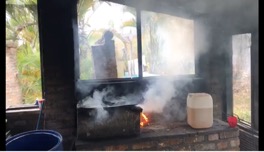
Kitchen facilities at Hogar CREA during a normal day of meal preparation.
The project was fast-paced both for Morgan to provide proof of concept to the IES Governing Board and for Mario to beat the rainy season which could seriously delay the project. However, the roadblocks continued to be placed between Mario and Morgan for an early completion of the project. The question came up on who would take responsibility and ownership of the project. This is where a new precedent was set, and IEEE Smart Village teamed up with IEEE Honduras Section. A Memorandum of Understanding (MOU) was developed between IEEE Smart Village and the Honduras Section, approved by IEEE legal team and executed. However, the challenges continued: IEEE transitioned from an old accounting system to the Next Gen Accounting system, which precluded a timely transfer of money from IEEE Smart Village to the Honduras Section, posing delays to the project.
This is where IEE Honduras Section again came to rescue and loaned the project money for completion. Finally, after the project was completed in mid-May, funds were transferred to the Honduras Section to cover the loan and project costs. Special thanks go out to the Honduras Chair Jorge Pogoaga and his section officers for their timely assistance.
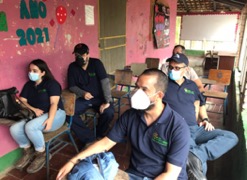
Officers and local volunteers meet in the Hogar CREA to listen to the stories from young mothers about their living conditions.

(Combo, from L-R): On the left side the inverter equipment and battery rack with a protective case located in the living room of the facilities. In the center, local volunteers from IEEE Honduras Section during a social gathering with beneficiaries and technicians. On the right, a new LED reflector light to illuminate the hallways of the kitchen area.
Many firsts took place during Morgan’s proof-of-concept project for which IEEE Smart Village owes a debt of gratitude to her, Mario and IEEE Honduras Section including a joint venture with the Honduras Section. However, the greatest outcome and reward from the project was to see the smiles of the women and children who were empowered by this project. ISV is appreciative of Morgan, Mario, Jorge and many others who made this project successful. Readers should note that this “proof-of-concept” project is phase 1 and more improvements are planned for phase 2.
Donations to IEEE Smart Village helps support local projects like this to transform lives in remote off-grid communities through education, entrepreneurship, renewable energy and technology. Visit this URL for more details: https://www.ieeefoundation.org/SmartVillage_donation
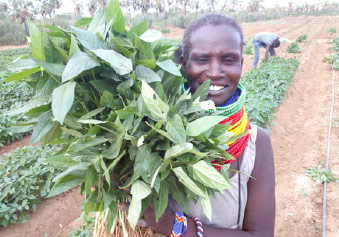
A village with a new dancing tune
At 46 years old, Elizabeth Lokhopon is a mother of seven children, and one of the lead farmers at the Natoot Farm Project in Turkana County Kenya. Elizabeth could not hide her joy after receiving a bunch of brachiaria grass for her animals. Turkana County is currently facing drought, and finding food and pasture is a challenge for most of the families living in the area.
“We now have food for our families and pasture for our animals. God is really amazing; at times I sit down and wonder how great His love is. When I remember the hardships of life that I went through in raising my children, I see God in action. In the past years, we lost most of our animals due to drought, we would go hungry for days, and providing even one meal a day for my children was a miracle. My children grew up knowing that food was a luxury and was to be eaten once a day; little did they know that things out there were different. Having been brought up in a pastoralist community, I knew that the only way to feed our animals is by moving about with them looking for pasture. It was amazing when I learned that, actually we could grow fodder for our animals and take all our children to school.”
At 46 years old, Elizabeth Lokhopon is a mother of seven children, and one of the lead farmers at the Natoot Farm Project in Turkana County Kenya. Elizabeth could not hide her joy after receiving a bunch of brachiaria grass for her animals. Turkana County is currently facing drought, and finding food and pasture is a challenge for most of the families living in the area.
“Though our farm is small in size, we are able to plant a variety of crops that supports our lives. From the time we begun planting crops in this farm, life has changed. The relationships among the neighbors have improved, and now we can borrow from one another because we are certain of having food tomorrow from our farms. We have also been taught that we can continue keeping animals and do farming at the same time. Most of my community members were fully dependant on animals for their livelihood. Those who were considered poor resolved to charcoal burning and brooms making to earn their daily bread, but with the prolonged drought experienced we lost most of our animals.”
Though farming is a relatively new practice and less practiced in Turkana County, especially among the communities living away from Lodwar tow, most of the farmers at the Natoot farm have already been transformed to depending on agriculture as their main income generating activity. In the past, anything green or any plant had for a long time been termed as pasture for the animals. For many families their stable food was meat and milk. And anyone who ate vegetables was referred to as poor. When an animal is slaughtered in a homestead, the meat was boiled and dried for preservation. The meat was then later served in small sizes to the family members with each passing day until the last piece.
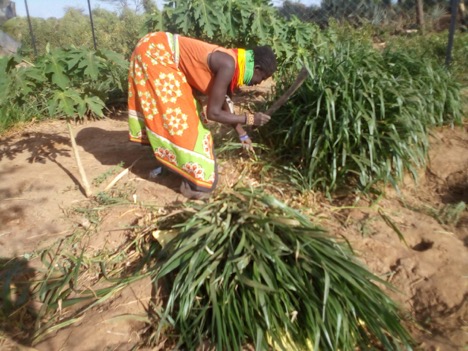
Elizabeth Lokhopon cutting the brachiaria plant
“We have not only learned on how to eat vegetables in our meals, but we have also learned to do business like the other women in the urban centers. We now take our vegetables to the Lodwar Municipal market to sell. Before farming was introduced in our village, we believed that selling of vegetables in the market was only meant for those who come from other counties that depend on agricultural produce for their livelihood. Little did we know that it was a business similar to that of selling of goats, brooms and charcoal. This farm has turned our life around, and has restored our lost hope. It has taken away all the worries and the uncertainty of life that we used to have. Now everyone feels loved.”
Elizabeth has now planted watermelons on her piece of land. She is optimistic that she will have a good harvest this time around, unlike the other time when the farm was flooded, attacked by pests that forced the farmers to uproot their crops prematurely.
“By the time this farm was introduced, I was about to give up on life. Nothing was working and all that we were depending on had lost market. People were no longer buying charcoal in large quantities. Market for brooms went down. Life in the urban centers was taking a new shape, but our village was still left behind. No development was forthcoming, everything seemed stagnant. The only information we longed for was from the chief’s office concerning relief distribution. Now we are dancing to a new tune in our homes thanks to the Naroot farm project!”
Though she still faces a few challenges, Elizabeth no longer waits for relief distribution. She is determined to feed and take care of her family from the farm produce. She still burns charcoal and makes brooms for sale, but she no longer strains to walk round the villages to sell.
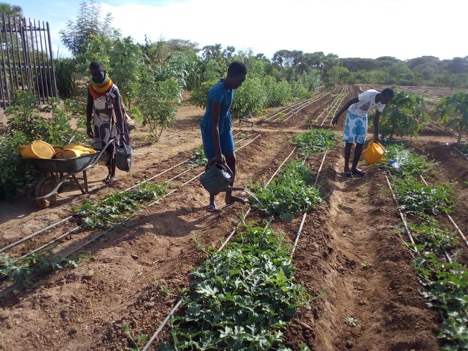
Elizabeth with her children at Naroot farm
The joy on her face and the sunny looks on her children’s faces tell it all, as they water their farm, now covered with watermelons, which are at a flowering stage. Elizabeth is now expecting to harvest her melon fruits in early July 2021. Indeed, when funds are well invested in a project, lives are transformed for the better.
Power Africa Conference 2021
Each year, IEEE Smart Village co-locates a series of workshops, presentations and round-table discussions at IEEE’s annual Power Africa Conference (PAC 2021). This year’s virtual event will be held August 23rd to 27th, 2021.
Help PAC 2021 by becoming a sponsor! Help global energy entrepreneurs to attend PAC 2021 and to participate in a variety of interactive workshops, networking opportunities, and competitions. Participation in PAC 2021 plays a central role in the continued success and development of a growing network of global IEEE Smart Village energy entrepreneurs. We are witnessing an increase in the number of qualified entrepreneurs desiring to attend the Virtual PAC 2021, however costly data plans make it difficult for many. Your contributions, as a stipend will put PAC 2021 within reach to these ‘budding’ energy entrepreneurs from remote corners around the globe. As a PAC 2021 Sponsor, you are helping them help their local villagers.
- $50,000 sponsorship will enable every delegate to attend the special tutorials tailored to IEEE Smart Village participants.
- $10,000 sponsorship will make it possible to award 5 existing or new entrepreneurs with a Covid-19 Response Project competition.
- $2,500 sponsorship will make it possible for 50 energy entrepreneurs to purchase a Data Plan needed to attend the Virtual PAC 2021 sessions.
Sponsorship funds will implement unique solutions that integrate energy and education towards fighting the effects of the pandemic and creating more sustainable activities during the post Covid-19 pandemic. Please share this special appeal with your business colleagues, and friends as well!
Please contact Mr. Michael Deering for sponsorship details: m.deering@ieee.org
Main +1.732.562-3915
Mobile: +1.609-731-1769.
IEEE Smart Village delegates include leaders from the supported programs alongside potential future energy entrepreneurs who are in the process of requesting funding. In order to ensure the widest possible involvement, IEEE Smart Village provides modest participation support to entrepreneurs on merit basis. With key grant support, many more energy entrepreneurs can attend and benefit from the training. The passion and care of people like you keep us going, and we hope we make you proud of how these funds benefit our entrepreneurs during these challenging times.
As part of the grant funding, the sponsor will be welcome to present to both the Smart Village delegates, as well as PAC 2021 registrants at large, on a variety of development issues related to their functional expertise. Appropriate recognition will be provided to the sponsor according to donation level, via a variety of print and electronic IEEE and IEEE Foundation media, as well as signage during the Power Africa 2020 Virtual Conference. THANK YOU!
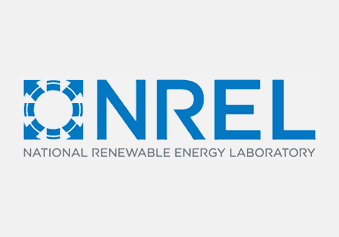
NREL Confirms Lithium-Ion Batteries have the Lowest Life Cycle Costs
A recent study by the National Renewable Energy Laboratory (NREL) found that the total life cycle cost (LCC) of lithium-ion batteries for installations in Sub Saharan Africa is lower than that of lead-acid batteries. This study was done in several countries for various loads. In all cases the lithium-ion batteries have a lower total cost of ownership.
The study also considered many factors in battery and system performance.
Note: These results do not apply to the more expensive Lithium Iron Phosphate (LiFePo) batteries.
Read more: https://www.nrel.gov/docs/fy19osti/73238.pdf
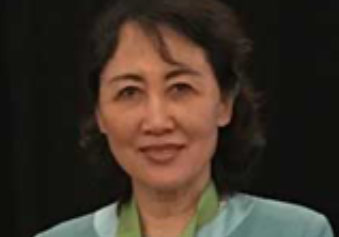
Empowering Women in Power & Energy
Dr. Ruomei Li, 2020 Chair of IEEE Women in Power (WIP) and former Secretary General of the Chinese Society for Electrical Engineering (CSEE), can’t say enough about the impact IEEE has had on her life and career since attending her first IEEE conference 22 years ago.
“By participating in IEEE activities and reading IEEE publications over the years, I’ve obtained a lot of useful technical information on current and future trends in my field of interest,” shared Dr. Li. “In addition, as a Ph.D. student, my paper was recognized as ‘the best presented and discussed paper’ at the IEEE Budapest Power Tech ‘99 Conference, which was a boost to my self-confidence, and my experience as an IEEE volunteer further enhanced my organizational and leadership skills.”
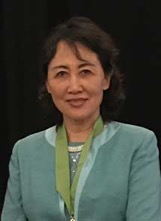
Ruomei Li, Ph.D. Member Grade: Senior Member
As the recipient of the IEEE Power & Energy Society (PES) Wanda Reder Pioneer in Power Award in 2019, “I’m very grateful to IEEE PES for recognizing my 37 years of work and research in the power engineering field and I hope that more outstanding female volunteers in IEEE Power and Energy will have the same opportunity to receive awards and recognition,” Dr. Li said. As the main initiator of the IEEE PES CSEE Yu-Hsiu Ku Award, which has become one of the most influential awards in the power engineering field in China, and through her recent donations to the IEEE Foundation as well as her regifting of her honorarium to the PES Women in Power Award Fund, Dr. Li hopes to extend that life-changing experience to fellow colleagues and forge a path for others to follow.
“Although the amount of money donated by any one individual may be limited, when more and more people join the effort, it can change the world,” Dr. Li said of the power of donations to IEEE. “By establishing new awards, I’m excited to help provide opportunities to others, encourage and inspire their contributions to society, and ultimately help more people around the world.”
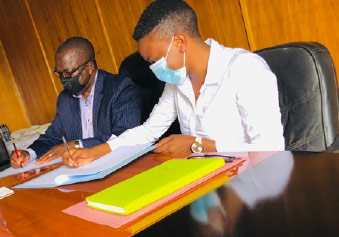
KSV-Zambia Flags off Gemstone Project
Kuumba Smart Vision-Zambia (KSV-Zed) has signed a Memorandum of Understanding (MoU) with Kariba Minerals Limited (KML) and the Gemstone Processing and Lapidary Training Centre (GPLTC) in Zambia for its project on cutting and polishing gemstones.
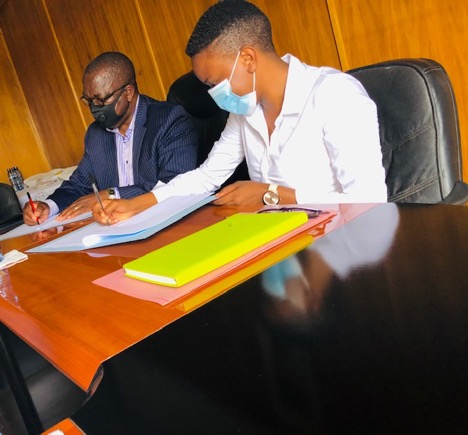
GPLTC Principal Victor Mulenga (L) signing of MoU with KSV- Zed President Kanekwa Kachinga (R)
The project is to provide the women with training, knowledge, and experience in gemstone processing, as they strive to empower themselves and their families. The selection of women into the project is based on their interest and area of origin. Most women presently enrolled in the program come from areas with precious stones, yet face in challenging environments of limited career options and training.
The MoUs signed bring the vision of KSV-Zed into reality as GPLTC provides the necessary knowledge and training, and KML offers the hands-on experience, raw materials, and expertise in the marketing and sales of the finished products.
“I believe this is the beginning of greater things for the young women in the rural areas. Most of the women who graduate from the program have the skills but are limited by the unequal opportunities between them and their male counterparts in the industry. Despite being trained with the skills, most of the women do not get employed in this industry and end up getting married, letting the skill die”, explained the GPLTC Principal Victor Mulenga.
He added, “Over the years we have tried to advocate for more women to be employed in the surrounding mines, unfortunately the employers have had their own reservations leading to few or no employment opportunities for these women. This has led to few women in the industry, which is saddening. But with the KSV-Zed partnership, I believe that more women will be inspired and contribute to improvement of the livelihood of villages they come from.”
Under the leadership of Kanekwa Kachinga, President of KSV-Zed, the project aims to train at least 15 women each year and has started by repairing and replacing some of the equipment at the training institution. Upon acquiring these skills, the women will continue working hand in hand with the school through the lapidary to process the stones as their own project and later form incubators. Each year KSV-Zed plans to increase the number of women in the program.
KML has being intrigued by the project calling it a “key of opportunities.” KML is dedicated to improving the lives of the young women mostly from where the amethysts are mined, a rural area called Maptizya. The Community, at the moment, does not have a facility to process the rough gemstones and rely on the GPLTC to cut and polish when the need arises.
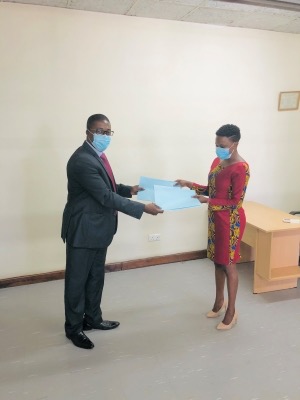
KML General Manager Peter Phiri (L) exchanging MoU with KSV-Zed President Kanekwa Kachinga (R)
“This is an opportunity we all have to embrace as it helps add value to the gemstones than sending them rough to other counties for processing. When value is added to these amazing stones, the cost is higher, and the revenue remains in the country which would help facilitate more projects. I am made to believe that with this project, the value additions will go to more community work for the locals which will help alleviate their lives.” KML General Manger Peter Phiri says, “Let us talk of Maptizya, for example, where this precious amethyst is mined, the local people do not have access to electricity, proper water, and sanitation. The nearest health post requires women in labor to carry 10 liters of water as they go to deliver, which is really saddening. However, I am here to believe that working with KSV-Zed will help implement more projects that will leave a great impact on the community and projects that are also sustainable.”
KSV-Zed is optimistic that the project will help create sustainable employment and empower the youth with necessary skills as it diversifies to other projects in the rural areas in Zambia.
KML has long been a reliable source of high-quality amethysts for major manufacturers of gemstones and related products. The company’s market share is estimated at over 90% of the amethyst originating from Zambia, and the largest single amethyst producer in the world. The company has been mining and producing amethyst for over 50 years in Zambia. KML is a private company, owned 100 percent by Zambia Consolidated Copper Mine – Investment Holdings (ZCCM-IH). ZCCM-IH is an investments’ holding company with diversified interests in mining, energy, and other sectors of the Zambian economy.
The GPLTC is an establishment of the Zambian Government through the Ministry of Higher Education (MoHE) whose core activity is to offer training in the identification, processing, marketing of gemstones and other related services in the Gemstone industry. The GPLTC also acts as a repository and information exchange center for Small Scale Miners (SSM) and gemstone traders.
Rwanda to host PAC 2022
The schedule date of the 2021 edition of the Power Africa Conference (PAC) 2021 is almost here, with less than 60 days to the 2021 edition in Kenya (Virtual). The Steering Committee of IEEE Power Africa has also announced that Rwanda will host 2022 edition of the annual conference, and accommodate various experts, entrepreneurs, industry practitioners, students, young professionals, policy makers, and government official in the land of a thousand hills.
It is common practice of the PAC Steering Committee to announce yearly the next country to host the conference. This is done for effective transition and continuity in the conference planning. This process starts with the call for proposal announced to interested host countries to submit proposals that are reviewed. The result of the reviews enables the steering committee to select the suitable country that will host the conference. The host team is provided with the opportunity to learn from the previous conferences, and build on the successes of the past editions.
This year’s edition is virtual due to the COVID-19 cases globally, however, with many countries advancing in the administering of the COVID-19 vaccines and with the likelihood that the administering will progress significantly globally towards the 2022 date, the team in Rwanda is optimistic the 2022 edition will be an in-person or a hybrid event.
Rwanda is beautiful and one of the smallest countries in Africa. The capital city is Kigali, and the country is where the African Great Lakes region and East Africa converge. This presents another opportunity for delegate to learn about Africa and to take advantage of the in-person conference to resume the technical and cultural sightseeing activities.
Article contribution by: African Working Group vice chair, Abdullateef Aliyu
Important links you don’t want to miss!
- Not an IEEE Member? How to join IEEE https://www.ieee.org/membership/join/index.html
- Click here to learn more about IEEE membership and special discounts for developing nations and low-income economies – https://www.ieee.org/membership/join/emember-countries.html
- For more information about discounts for societies, check in the following link: https://www.ieee.org/communities/societies/index.html
- Learn more about ISVx at PowerAfrica Conference – https://ieee-powerafrica.org/isvx/
